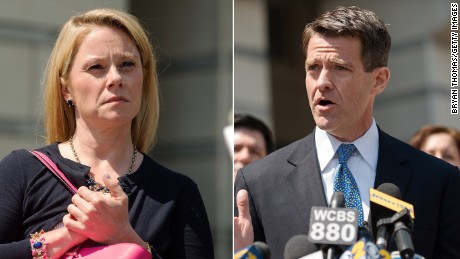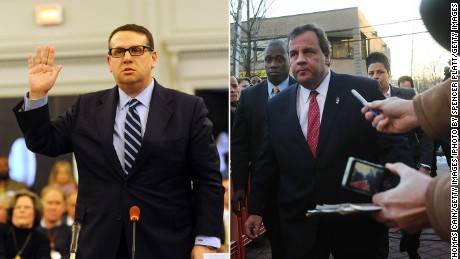Gorsuch declined to explain his legal views or offer an assessment of past Supreme Court cases. He said he decides disputes based only on the facts and the law.
“There’s no such thing as a Republican judge or a Democratic judge,” he asserted. “We just have judges in this country.”
In countless ways, the man President Donald Trump has chosen to succeed the late Justice Antonin Scalia downplayed the judicial branch and the importance of a single justice appointed to a lifetime seat.
But that message belies the many 5-4 rulings in recent years that have changed American life and the reality that judges cannot always look simply to the facts and relevant law to resolve a dispute.
The Constitution contains concepts, not clear-cut formulas. And while justices resist characterization based on ideology or politics, their voting patterns can suggest policy preferences. The current four justices appointed by Republican presidents vote, by and large, for conservative results; the four Democratic appointees vote generally for liberal outcomes.
Gorsuch’s record on a Denver-based US appeals court indicates he would align with Scalia’s views as a fifth conservative justice. That would return the court to the 5-4 posture that produced such decisions as the 2010 Citizens United v. Federal Election Commission, which lifted limits on corporate money in elections, and 2013 Shelby County v. Holder, which curtailed voting-rights protections for racial minorities and others who face discrimination at the polls.
Along the same 5-4 lines, the justices in recent years have restricted class-action claims by consumers and workers; allowed more religion in public life, such as prayer at local government meetings; and rejected challenges to the death penalty.
One major exception to that ideological pattern was the 5-4 ruling in 2012 that upheld the constitutionality of President Barack Obama’s health care law, which Trump and the House Republican leadership failed to repeal in a stunning legislative defeat last week.
Chief Justice John Roberts cast the decisive vote in the case, siding with the four liberals in preserving Obamacare based on his reasoning about federal taxing power. Roberts’ most vocal critics at the time, including Trump, viewed the move as political, not grounded in facts and law.
For his part, Gorsuch refused to explain his views of congressional authority and separation of powers or constitutional due process and equality in his testimony before the Senate Judiciary Committee last week. He did not tip his hand on how he would resolve disputes over a woman’s right to end a pregnancy, a key question for senators on both sides of the aisle.
To be sure, the 49-year-old federal appellate judge is not the first Supreme Court nominee to keep his views close to the vest, but he did it to a greater extent.
“What worries me,” said the committee’s ranking Democrat Dianne Feinstein, of California, “is that you have been very much able to avoid specificity like no one I have ever seen before.”
Rising stakes
The current Supreme Court is split 4-4 on many tough issues and has been cautious about taking up thorny new disputes while shorthanded. The bench has been without a ninth justice for more than 400 days, since February 13, 2016, when Scalia was found dead at a Texas hunting resort. The 79-year-old justice apparently died in his sleep.
Obama nominated Merrick Garland, chief judge of the US Circuit Court of Appeals for the District of Columbia, a year ago this month, but Senate Republicans refused to act on the nomination.
Within two weeks of taking the oath of office in January, Trump tapped Gorsuch. At the same time, the President has undertaken a series of initiatives, such as barring travelers from certain Muslim-majority countries, that have prompted a flood of legal challenges and raised the stakes at the high court.
Despite Democratic concerns about Gorsuch’s record and vague testimony, he is likely to be confirmed. Senate Minority Leader Chuck Schumer of New York has threatened to block a vote on the nominee through a filibuster, which would require 60 votes to overcome, Republicans, who hold 52 seats, have threatened to get around the move by changing Senate rules to allow a simple majority of senators to cut off debate and allow a vote.
Some Democrats do not want to lose the filibuster tradition, especially considering that Trump could see more opportunities to alter the court’s ideological balance given the ages of some justices. Justice Ruth Bader Ginsburg, a liberal, turned 84 this month, and Justice Anthony Kennedy, the most centrist conservative and a key vote in favor of gay marriage and abortion rights, will be 81 in July.
Defining Judge Gorsuch
As a judge on the 10th U.S. Circuit Court of Appeals since 2006, Gorsuch has narrowly interpreted constitutional rights and statutory benefits. He takes an “originalist” approach, reading the Constitution in terms of its 18th Century understanding.
Separately, the Harvard law graduate who studied at the University of Oxford, wrote a book, “The Future of Assisted Suicide and Euthanasia,” that argues against medical aid in dying and deems the intentional taking of human life by private persons “always wrong.”
Overall, he believes societal dilemmas should be left to Congress and elected lawmakers in the states.
“Sometimes we judges judge best when we judge least,” he told senators.
Two of his court opinions drew particular Senate scrutiny. In one, Gorsuch ruled against a truck driver whose trailer broke down in subzero temperatures. The brakes had frozen, and after becoming numb in the cold (the heat was not working in the cab), the driver unhitched the rig and temporarily drove away. His employer fired him for leaving the trailer.
The 10th Circuit ruled for the trucker, who claimed that under the circumstances he should have been protected by federal worker-safety law. Gorsuch dissented, noting that the truck company told the driver to sit and wait for help and finding that his claim fell outside the law’s plain meaning.
Democratic Sen. Al Franken of Minnesota mocked the result as “absurd” and pressed Gorsuch about what he would have done under the circumstances.
“Senator, I don’t know,” Gorsuch said. “I wasn’t in the man’s shoes.”
In another case highlighted by Democrats, Gorsuch narrowly interpreted a federal law that requires equal opportunity for children with disabilities in school instruction and services. In a decision for the 10th Circuit against an autistic child’s claim, Gorsuch said the law dictates that schools provide benefits “merely … more than de minimis.”
In a similar case that the Supreme Court resolved, as it happens, while Gorsuch was testifying Wednesday, the justices rejected that reasoning. By a unanimous vote, the court said in an opinion by Chief Justice Roberts that the standard of the Individuals with Disabilities Education Act is “markedly more demanding” that the one adopted by Gorsuch.
“When all is said and done, a student offered an educational program providing ‘merely more than de minimis’ progress from year to year can hardly be said to have been offered an education at all,” Roberts wrote.
Gorsuch told senators he had adhered to 10th Circuit precedent. “If anyone is suggesting that I like a result where an autistic child has to lose, that’s a heartbreaking accusation,” he said.
“A good judge” follows precedent even if he does not favor the outcome, Gorsuch stressed during his three days of testimony before the senators.
But on the assertion that judges always set aside personal values, Democratic Sen. Dick Durbin of Illinois said, “I don’t buy that.”
Durbin said decisions cannot be “so robotic, so programmatic that all you need to do is look at the facts and look at the law and there’s an obvious conclusion.”
Gorsuch said if he revealed his legal thinking, he could be seen as promising to vote a certain way and signaling to litigants that he lacked an open mind. Sitting at the plain desk he chose over the usual stately draped table, Gorsuch stuck to his opening theme: “Putting on a robe reminds us that it’s time to lose our egos and open our minds. … Ours is a judiciary of honest black polyester.”
Democrats seemed more concerned about what he might have promised, even implicitly, to Trump and the conservative advocates from the Federalist Society and Heritage Foundation who vetted him. Trump has vowed to appoint judges who would overturn the 1973 Roe v. Wade decision that made abortion legal nationwide.
Senator Lindsey Graham, a Republican from South Carolina, asked the nominee what he would have done if Trump had asked him to overturn Roe v. Wade.
“I would have walked out the door,” Gorsuch answered. “That’s not what judges do.”




